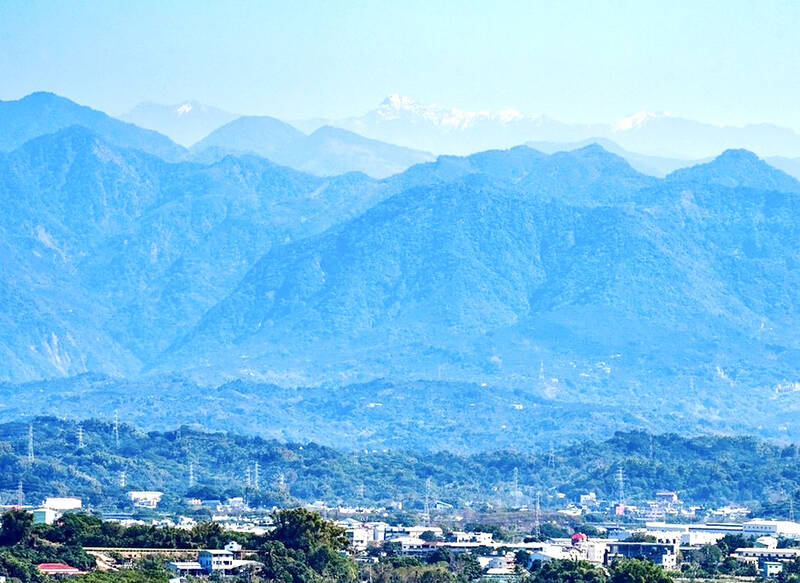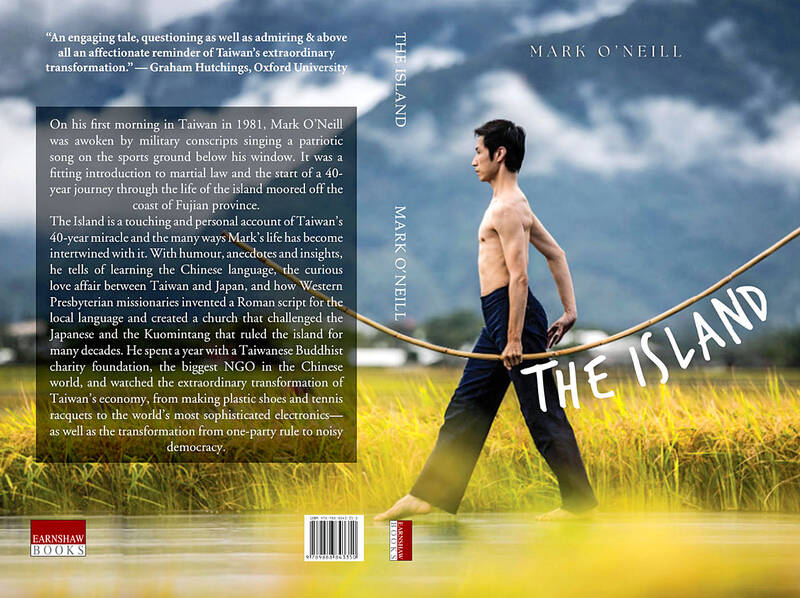Mark O’Neill is full of gratitude.
He is grateful for his opportunities as a young journalist reporting from Northern Ireland during the Troubles; grateful to his boss at BBC Ulster who recommended O’Neill for a job at Radio Television Hong Kong; grateful to his colleagues at the station for “leading this blind man through the forest;” grateful to a Taiwanese friend who encouraged him to study Mandarin in Taiwan in 1981; and he is grateful for “the friendship of many kind Taiwanese” he met during the two-and-a-half years he spent here during his first stay.
This positive impression of Taiwan and its people has endured.

Photo courtesy of reader
“The people have always been polite, friendly and humorous,” O’Neill tells the Taipei Times.
On subsequent visits, he has found that little has changed in that regard.
“The only difference since July 1987 [when martial law was lifted] is that they have become more relaxed, freer to speak, think and wear as they wish.”

Photo courtesy of Earnshaw Books
For this reason, O’Neill is delighted to have finally produced a testament to Taiwan and its people: The Island — the story of Taiwan’s transition into a democracy and economic powerhouse. It is, writes O’Neill in the book’s foreword, “one of the most remarkable transformations in the world.”
To introduce the book, O’Neill will give a presentation on Thursday from 2pm to 5:30pm at Sense Forest Coffee Shop (思享森林咖啡共享空間), 2F, 245 Roosevelt Road, Sec 3, Taipei City (台北市羅斯福路三段245號2樓). Admission is free. O’Neill will also introduce the book at the expat run Breakfast Club in Taipei on Sunday. For more information, contact Linda: linda2007@tmu.edu.tw.
Emphasizing that the book is a personal account, as he is neither “knowledgeable nor qualified enough to write a comprehensive history,” O’Neill nonetheless hopes his reflections will help explain Taiwan’s transformation.

Photo: Huang Ming-tang, Taipei Times
Having previously published books on Taiwan-related subjects, including a history of the (National) Palace Museums in Taipei and Beijing and a biography of Faina Chiang Fang-liang (蔣方良), the wife of Taiwan’s late president Chiang Ching-kuo (蔣經國) (reviewed in Taipei Times Aug. 6, 2020), O’Neill again speaks appreciatively of the assistance he received with his research.
INSPIRATIONAL MEETING
“Everyone was most helpful in providing material and answering questions,” he says.
In fact, the idea for the work on the museums emerged from an “inspirational” encounter with Chou Kung-hsin (周功鑫), former director of Taiwan’s National Palace Museum.
“[Chou] told the story of the 16-year odyssey of the art treasures across the mainland [sic], and finally Taiwan; it was hypnotic.”
Since the publication of his first book in 2006, an account of the Buddhist Compassion Relief Tzu Chi Foundation (佛教慈濟慈善事業基金會), O’Neill has been prolific. To date, he has released 15 titles, more than half of them in both Chinese and English.
He credits Hong Kong’s Joint Publishing —the publisher for nine of his books —and former deputy chief editor Anne Lee (李安), who “graciously took a bet on a person she barely knew.”
BIOGRAPHICAL FOCUS
Reflecting on a fruitful working relationship, he says Lee helped shape his focus on biographies of historical figures. These include studies of Irish-born British diplomat and Qing Dynasty official Sir Robert Hart; twentieth century China’s most influential intellectual, Hu Shih (胡適); and O’Neill’s own grandfather, Frederick, an Irish missionary in Manchuria from 1897 until his expulsion by the Japanese in 1942.
“Anne liked biographies of eminent people, so we chose grandfather, Sir Robert Hart and Hu Shih,” O’Neill says.
His latest biography, The Man Who Made a Literate Nation — on the life of Zhou Youguang (周有光), the developer of the Hanyu Pinyin romanization system — will be spotlighted in a talk at the Taipei International Book Exhibition on Friday at 2:15pm.
Another life story — on Liang Sicheng (梁思成), considered the father of modern Chinese architecture — is in the works. Again, O’Neill praises Lee for setting the process in motion.
“God bless Anne Lee!” he says. “Without her, none of this would have happened.”
SPIRITUAL BENT
As this last exclamation demonstrates, O’Neill also recognizes a higher power as having steered and smoothed his path as a writer.
Entwined with connections to Ireland and China, religion pervades O’Neill’s life and family history. Both his missionary grandfather and father studied at Belfast’s Queen’s University, and — as mentioned — the younger O’Neill cut his teeth covering the Northern Ireland at the height of the Troubles.
He explores these and other connections between Ireland and China in Out of Ireland (2023). Following the release of Frederick: The Life of My Missionary Grandfather in 2012, O’Neill visited the church his forbear founded in Faku County (法庫) in Liaoning Province (遼寧), China. There, he presented 20 copies of the book to the pastor and his congregation.
“Some members wept; they said that it was the first time they learned of how the Word came to their town,” says O’Neill. “That day God, and grandfather, were smiling on us, one of the most unforgettable of our lives.”
Despite the strong Christian bent of O’Neill’s language, he is not exclusively attached to one religion and sees “no conflict” in a spirituality that encompasses multiple expressions of faith.
SOFT POWER PROJECTION
His year working alongside Tzu Chi volunteers, during which he accompanied them on trips to Jakarta, Durban and Los Angeles, was revelatory.
In particular, he was immediately impressed by the movement’s founder Dharma Master Cheng Yen (證嚴).
“After entering her room, I realized I was in the presence of an extraordinary person,” he says.
The charitable works he observed also left him profoundly moved, and he recalls one South African volunteer saying, “when I die, I do not want to go to Heaven, but to Hualien,” where Tzu Chi was founded.
He believes that such efforts are “among the greatest contributions of Taiwan to the world.” More generally, he believes Taiwan’s civil society has helped project the country’s image and influence.
“Much of Taiwan’s soft power abroad comes from its NGOs,” he says.
Looking forward to his latest visit, O’Neill reflects on Taiwan’s progress since he first arrived more than 40 years ago. The recent presidential election is, he thinks, a perfect example.
“The campaigning was passionate, non-violent and transparent; there was a high turnout; and after the result was announced, [Chinese Nationalist Party KMT candidate] Hou You-yi (候友宜) accepted it and apologized to his supporters,” says O’Neill “Western democracies should learn from this.”

In the March 9 edition of the Taipei Times a piece by Ninon Godefroy ran with the headine “The quiet, gentle rhythm of Taiwan.” It started with the line “Taiwan is a small, humble place. There is no Eiffel Tower, no pyramids — no singular attraction that draws the world’s attention.” I laughed out loud at that. This was out of no disrespect for the author or the piece, which made some interesting analogies and good points about how both Din Tai Fung’s and Taiwan Semiconductor Manufacturing Co’s (TSMC, 台積電) meticulous attention to detail and quality are not quite up to

April 21 to April 27 Hsieh Er’s (謝娥) political fortunes were rising fast after she got out of jail and joined the Chinese Nationalist Party (KMT) in December 1945. Not only did she hold key positions in various committees, she was elected the only woman on the Taipei City Council and headed to Nanjing in 1946 as the sole Taiwanese female representative to the National Constituent Assembly. With the support of first lady Soong May-ling (宋美齡), she started the Taipei Women’s Association and Taiwan Provincial Women’s Association, where she

Chinese Nationalist Party (KMT) Chairman Eric Chu (朱立倫) hatched a bold plan to charge forward and seize the initiative when he held a protest in front of the Taipei City Prosecutors’ Office. Though risky, because illegal, its success would help tackle at least six problems facing both himself and the KMT. What he did not see coming was Taipei Mayor Chiang Wan-an (將萬安) tripping him up out of the gate. In spite of Chu being the most consequential and successful KMT chairman since the early 2010s — arguably saving the party from financial ruin and restoring its electoral viability —

It is one of the more remarkable facts of Taiwan history that it was never occupied or claimed by any of the numerous kingdoms of southern China — Han or otherwise — that lay just across the water from it. None of their brilliant ministers ever discovered that Taiwan was a “core interest” of the state whose annexation was “inevitable.” As Paul Kua notes in an excellent monograph laying out how the Portuguese gave Taiwan the name “Formosa,” the first Europeans to express an interest in occupying Taiwan were the Spanish. Tonio Andrade in his seminal work, How Taiwan Became Chinese,